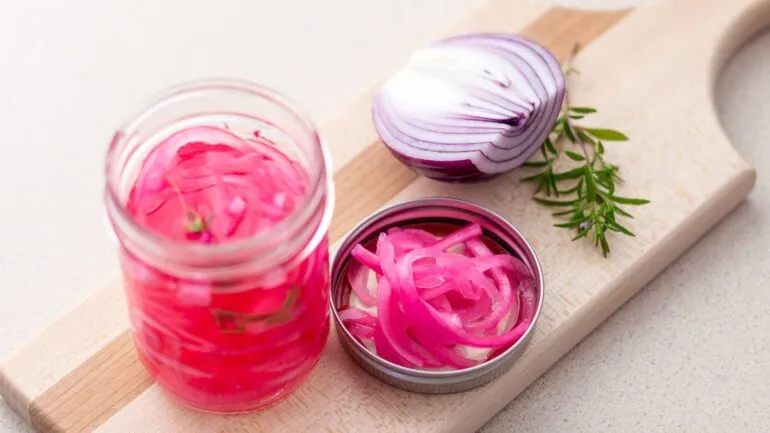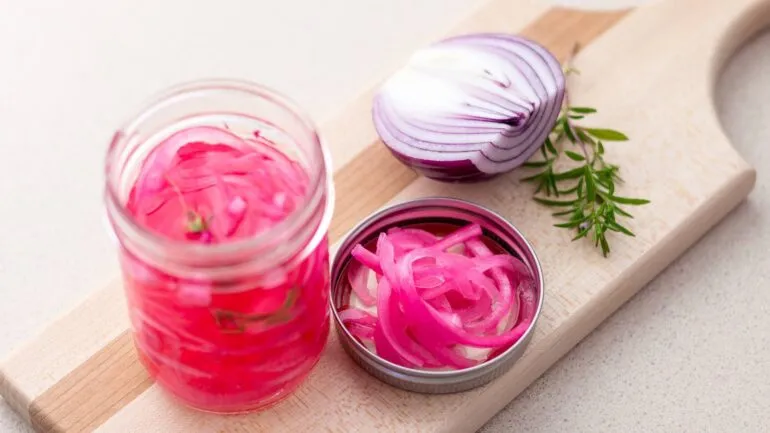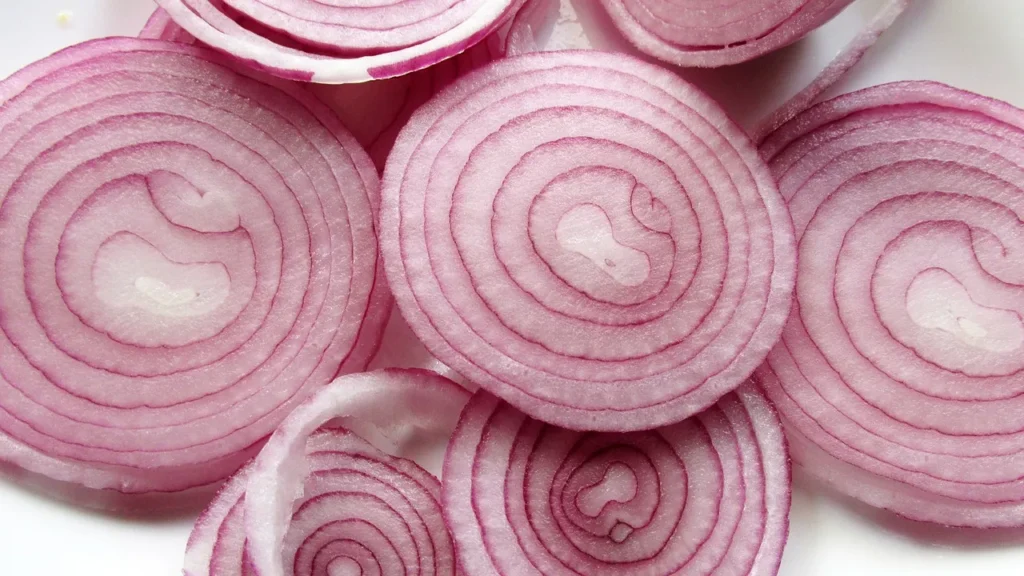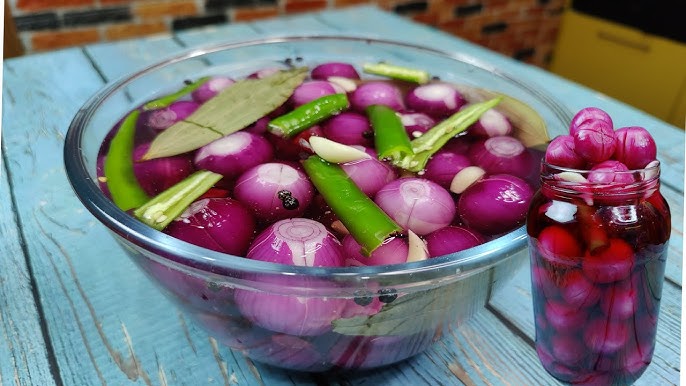Onion salad in vinegar is a popular dish that many people enjoy for its tangy taste and health benefits. This dish is made by soaking sliced onions in vinegar, often with a sprinkle of salt and other seasonings.
It’s not just a tasty addition to meals but also comes packed with nutritional advantages.
In this introduction, we’ll explore why this simple salad could be good for your health, focusing on the ingredients used and their effects on your body.
Is Onion Salad In Vinegar Good For Health?


As a leading nutritionist, I often get questions about including onions in vinegar in diet plans.
Many people want to know if this simple dish can be part of their healthy diets without adding too many calories. I can say that onion salad in vinegar is a good choice when eaten in moderation.
This dish mixes the sharp taste of vinegar with the nutritional benefits of onions. Onions are low in calories but high in vitamins and antioxidants that help fight inflammation and reduce the risk of diseases. Vinegar is also beneficial for controlling blood sugar levels and supporting heart health.
However, it’s important to watch how much salt and sugar are added for flavor, as too much can lessen the health benefits.
In the next sections, I’ll explain more about how onion salad in vinegar can fit into a healthy diet, focusing on what makes it nutritious and how it affects your health.
This will help ensure that this dish is both tasty and good for you.
Basic Nutrition Facts Of Onions


Onion Salad
A medium-sized onion has:
- Calories: 45
- Fat: 0 grams
- Carbohydrates: 11 grams
- Fiber: 3 grams
- Sugars: 9 grams
- Protein: 1 gram
- Vitamin C: Provides 20% of what you need each day
- Calcium: Provides 4% of daily needs
- Iron: Provides 4% of daily needs
- Very little salt: 5 mg
- Potassium: 190 mg, which is 5% of what you need each day
These nutrients make onions great for your immune system and heart, and they help keep your body running smoothly.
Health Benefits Of Eating Raw Onions
Onions are packed with substances that are good for you:
- Boost Heart Health: Red onions are packed with folate, or vitamin B9, which not only enhances cardiovascular health but also reduces the risk of strokes.
- Aid Digestion: Apple cider vinegar is known for its ability to support digestive health.
- Enhance Immunity: Apple cider vinegar promotes overall immune function.
- Manage Blood Sugar: Combining onions and white vinegar can help maintain healthy blood sugar levels.
- Protect Against Oxidative Stress: Both onion peels and apple cider vinegar can boost brain health and provide antioxidant benefits.
- Support Gut Health: Pickled onions are beneficial for gut health.
- Slow Aging: Onion vinegar is rich in antioxidants and may slow aging processes.
According to nutrition experts, onions are particularly good for the heart because they can lower blood pressure and reduce the risk of heart attacks.
What Happens When Onions Are Put in vinegar?
Pickling is a way to preserve onions by soaking them in vinegar and often adding salt and sugar. This method changes some of the onion’s original health benefits.
Nutritional Changes in Onions when they put in vinegar
- Less Vitamin C: Some vitamins are lost during the pickling process because of the heat and acid.
- More Salt: Pickling usually adds a lot of salt, which can be bad for heart health.
- Added Sugar: Sugar is often added to make the sour vinegar taste better, but it can increase blood sugar levels.
Despite these changes, pickled onions still retain many of the good nutrients that raw onions do.
How Nutritious Are Onions In Vinegar?


If you eat about 100 grams of pickled onions, you get:
- Calories: 23
- Carbs: 4.9 grams (which includes 7 grams of fiber)
- Protein: 0.8 grams
- Fat: Very little, only 0.1 grams
This shows that pickled onions are still low in calories and fat, and they can be a good source of fiber.
Health Risks from Eating Onions In Vinegar?
The main concerns with pickled onions come from the ingredients used in pickling:
- Too Much Salt: Eating a lot of salt can lead to high blood pressure and heart problems.
- Acid from Vinegar: Too much acid can harm your teeth and stomach, and it might even lead to certain types of stomach cancer.
- Sugar Levels: The sugars can be an issue, especially for people with diabetes.
Is It Healthy to Eat Pickled Onions?
Eating pickled onions in small amounts can be part of a healthy diet because they still offer some nutritional benefits. However, it’s important to watch how much you eat, especially if you’re watching your salt or sugar intake.
Tips for Healthier Onions in vinegar?
- Less Salt and Sugar: Look for recipes that use less salt and sugar.
- Quick Pickling: Don’t let the onions soak in the vinegar mix for too long to avoid absorbing too much salt and vinegar.
- Use as a Topping: Instead of a main part of your meal, use pickled onions as a small addition for extra flavor.
FAQs
What are onions in vinegar?
Onions in vinegar are onions that have been preserved in a mixture of vinegar, salt, and sometimes sugar. This preservation process alters their flavor and texture.
Are onions in vinegar healthy?
Yes, onions in vinegar can be healthy when consumed in moderation. They retain many nutrients found in fresh onions but also contain high levels of salt and vinegar, which could be harmful in large quantities.
Can I eat onions in vinegar every day?
It’s better to eat onions in vinegar only occasionally. Due to their high salt content, consuming them daily could lead to health issues such as high blood pressure.
Do onions in vinegar have more calories than raw onions?
No, onions in vinegar usually have fewer calories than raw onions because they tend to be consumed in smaller amounts. Be aware that they might have added sugars.
What are the benefits of eating onions in vinegar?
Onions in vinegar are low in calories and rich in beneficial nutrients like fiber, vitamin C, and antioxidants. They can enhance the flavor of various dishes without significantly increasing calorie intake.
What should I watch out for when eating onions in vinegar?
Pay attention to the salt and sugar content in onions in vinegar. If you have conditions such as high blood pressure or diabetes, you need to be especially cautious about how much you eat.
Conclusion: Onion Salad In Vinegar
Pickled onions can be a tasty and healthy addition to your diet if used wisely and in moderation.
They keep many of the benefits of raw onions but need careful preparation to reduce the risks of too much salt and vinegar. Like any food, the key is balance and moderation.























